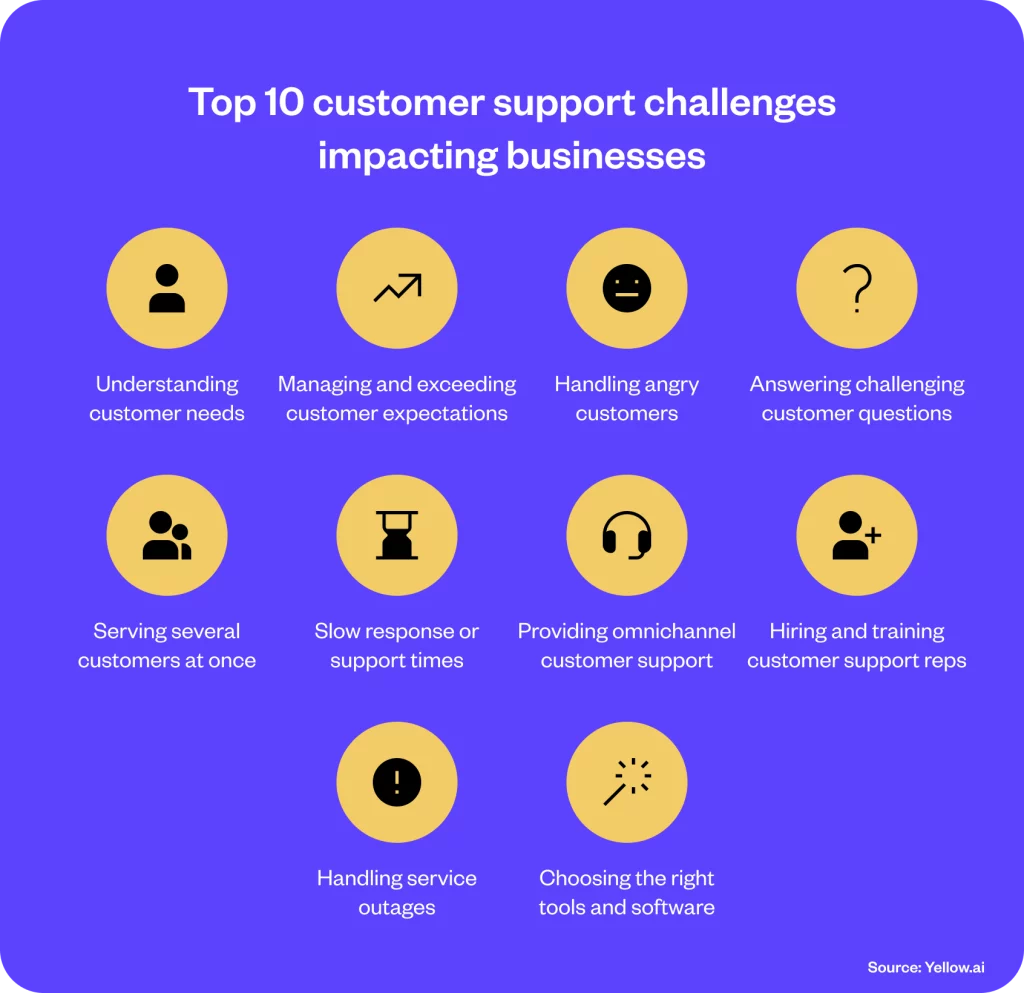In a rush and need the TL/DR version?
Summarize
Customer service challenges in 2024 are pushing businesses to adapt swiftly to maintain high standards of customer satisfaction and brand reputation. This blog delves into ten key challenges and offers innovative solutions to tackle them effectively, ensuring businesses can thrive amidst evolving expectations and technological advancements.
Key points to navigate customer service challenges in 2024:
- Understand customer needs: Utilize AI-driven analytics and empathy training to tailor services to individual customer preferences.
- Exceed customer expectations: Regularly update service strategies and use tools like proactive chatbots to enhance customer interaction.
- Manage angry customers: Establish clear protocols and train staff in de-escalation techniques to handle complaints effectively.
- Answer complex questions: Keep customer service teams well-informed and supported by comprehensive knowledge bases.
- Serve multiple customers efficiently: Implement automated systems and effective queuing procedures to manage high volumes of interactions.
- Provide fast responses: Use automated responses for common inquiries and optimize processes to improve speed and accuracy.
- Ensure omnichannel consistency: Develop a unified strategy for all customer service channels to maintain consistent quality.
- Train and retain talent: Focus on continuous learning and motivation to keep customer service teams effective and satisfied.
- Handle service outages gracefully: Prepare clear communication strategies and backup plans for service disruptions.
- Choose the right tools: Select customer service tools that align with your business goals and integrate seamlessly with other systems.
Navigating these challenges effectively positions businesses as leaders in innovative customer service, ready to adapt and thrive in the dynamic landscape of 2024 and beyond.
Note: This summary is not a substitute for reading the article in full, as you may miss out on important nuances.
Customer service is an ever-evolving landscape. In this landscape, businesses continuously encounter a variety of challenges that can impact customer satisfaction and brand reputation. This blog talks about the top ten customer service challenges of 2024 and covers essential details, from understanding complex customer needs to managing evolving expectations and handling service outages. We’ll explore practical strategies for overcoming these challenges, including the latest trends in resolving customer service issues. With a focus on how to navigate these hurdles, this guide offers insightful solutions for businesses aiming to maintain excellent customer service standards.
Introduction
The world of customer service is a complex puzzle. Here, each interaction shapes the perception of your brand. In 2024, businesses are facing a new wave of customer service challenges, each requiring a unique mix of empathy, strategy, and technological prowess. It’s a landscape where a single misstep can ripple through social media, impacting brand loyalty and customer trust.
Navigating the maze of customer service in 2024 is just like steering a ship through uncharted waters. Every customer interaction is a potential turning point in the journey of brand perception. Data shows that 86% of today’s buyers are willing to pay more for a great customer experience. So remember, the stakes in customer service have never been higher.
Customer expectations soar today, and patience wears thin. Hence, businesses are facing a litany of challenges that test the mettle of even the most seasoned service professionals. In this blog, we’re not just listing problems; we’re decoding them. The following sections will get into each challenge, explain the causes, and then strategically navigate through solutions that are innovative and practical. From the surge in customer expectations to the integration of cutting-edge technologies, these challenges are a call to action for businesses to elevate their customer service game. Read on to turn these challenges into opportunities for growth and enhanced customer relationships.
Related must-reads:
- 10 Bad customer service examples (How to fix them)
- Customer service automation – A full guide
- 12 Customer service metrics to measure in 2024
- Should your business outsource customer service?
- Top 10 customer service tips for 2024: Elevate your support
What is the challenge of customer service?
Navigating customer service in today’s dynamic business environment is just like solving a complex puzzle with ever-shifting pieces. It’s way too much than merely responding to queries or resolving issues; it’s about genuinely understanding and connecting with customers on a deeper level.
Here’s a closer look at what makes customer service both challenging and fascinating:
- Evolving customer expectations: Today’s customers are not just looking for answers; they seek experiences. They desire quick, efficient service along with a personal touch. Businesses must constantly evolve and innovate to keep up with these changing expectations.
- Blending technology and humanity: The 21st century is dominated by digital solutions. But the real challenge is combining technology like AI and chatbots with the irreplaceable human element of empathy and understanding. It’s about using tech to enhance service, not replace the personal touch that customers value.
- Uniform service across all platforms: The rise of omnichannel support has brought its own set of challenges. Ensuring that a customer receives the same quality of service, whether they reach out via social media, email, or phone, is a complex task requiring a well-coordinated strategy.
- Guarding data privacy and security: As customer interactions become more data-driven, protecting this data is paramount. Customers trust businesses with their information, and upholding this trust by ensuring data security is a critical challenge.
- Overcoming language and cultural barriers: The global nature of business today means interacting with a diverse clientele. Understanding cultural nuances and overcoming language barriers to provide seamless service is a skill that sets excellent customer service apart.
- Empowering and retaining talent: An excellent customer service team is the backbone of any business. Keeping these teams trained, motivated, and in sync with the company’s ethos is crucial. High staff turnover or poorly trained personnel can drastically affect service quality.
- Staying ahead of market and tech trends: The business world never stands still, especially in terms of technology and market trends. Staying informed and adapting to these changes ensures that customer service strategies remain relevant and effective.
Why is customer service problem-solving important?
Solving customer service issues is crucial for any business, as it directly impacts customer satisfaction. When a problem arises, addressing it promptly and effectively is like repairing a bridge between you and your customers. Besides maintaining a strong connection, it also builds trust. Customers remember how you handle their issues, and this can influence their decision to continue doing business with you.
Ignoring customer service problems can quickly lead to negative consequences. One unresolved complaint can escalate, especially in today’s world, where social media amplifies voices. Think of it as a small crack in a dam that can widen under pressure. By resolving issues efficiently, you solve the immediate problem and also protect your brand’s reputation from potential damage.
Good customer service sets your business apart. In a competitive market, how you handle service issues can be the deciding factor for customers choosing between you and your competitors. Solving these problems effectively shows that you value your customers, which can encourage loyalty and positive word-of-mouth recommendations.
Lastly, every customer service issue provides valuable insights. It’s like receiving direct feedback from the people who use your products or services. This feedback is essential for identifying and fixing any weaknesses in your offerings, leading to continuous improvement and adaptation to your customers’ evolving needs. Addressing customer service problems effectively is more than just about fixing immediate issues. Instead, it’s about strengthening and growing your business in the long run.
Transform your customer service today with Yellow.ai

Top 10 customer support challenges impacting businesses in 2024
The customer service landscape in 2024 presents a range of challenges, each distinct yet interconnected. Navigating these challenges requires innovative solutions, empathy, and technological integration. Let us explore 10 prominent customer service challenges businesses face, exploring their complexities, impacts, and solutions.

Challenge #1. Understanding customer needs
The heart of customer service is grasping the unique needs of each customer, a task that grows more complex with diverse client bases and evolving market trends. Failing to understand customer needs can lead to unsatisfactory solutions, damaging brand loyalty. For example, a customer seeking a customized product solution might receive a generic, irrelevant response, leading to frustration and loss of trust.
Solutions
- Implement empathy training for staff to understand customer perspectives better.
- Utilize AI-driven analytics to gain insights into customer preferences and behaviors.
- Foster an environment of active listening and personalized responses.
Challenge #2. Managing and exceeding customer expectations
In today’s competitive market, merely satisfying customers is not enough. Businesses must consistently exceed expectations. Not exceeding expectations can result in customers turning to competitors. Imagine a customer expecting proactive service updates being left in the dark, leading them to feel undervalued.
Related read: How customer service expectations differ from generation to generation?
Solutions
- Regularly update services and communication strategies based on customer feedback.
- Train customer service teams to anticipate customer needs and offer proactive solutions.
- Implement tools like Yellow.ai chatbots for dynamic customer interaction and expectation management.
Challenge #3. Handling angry customers
Addressing dissatisfied or angry customers is inevitable and requires delicacy and quick resolution. Poor handling of angry customers can escalate issues, tarnishing the company’s reputation. An unresolved complaint can quickly become viral, deterring potential customers.
Solutions
- Establish a clear, empathetic approach to handling complaints and escalations.
- Train staff in de-escalation techniques and customer empathy.
- Use customer feedback as an opportunity for service improvement and conflict resolution.
Challenge #4. Answering challenging customer questions
Customer service teams often face complex queries that require detailed knowledge and effective communication. Inadequate responses can lead to customer dissatisfaction and decreased credibility. For instance, a customer asking for detailed usage guidance is met with vague, generic answers.
Solutions
- Ensure continuous training and updates for staff on products and services.
- Develop a comprehensive FAQ and knowledge base for quick reference.
- Implement support tools that provide real-time information to customer service reps.
Challenge #5. Serving several customers at once
Balancing multiple customer interactions simultaneously is a test of efficiency and multitasking skills. Overburdened customer service reps can lead to longer wait times and reduced service quality, causing customer dissatisfaction.
Solutions
- Utilize automated systems like chatbots to handle routine queries.
- Implement effective workload management and queuing systems.
- Train staff in prioritizing tasks and managing time effectively.
Related read: 10 Reasons why is customer service important in 2024
Challenge #6. Slow response or support times
Providing prompt responses and support is essential in an era of instant gratification. Slow responses can lead to customer frustration and loss of business. For example, delayed technical support can push customers to seek alternatives.
Solutions
- Implement automated responses for common inquiries.
- Optimize internal processes for speedier issue resolution.
- Regularly review response time metrics to identify and address bottlenecks.
Challenge #7. Providing omnichannel customer support
Offering consistent and high-quality service across multiple channels is complex but essential. Inconsistent service across channels can confuse and frustrate customers, impacting their overall experience with the brand.
Related must-reads:
- A guide on omnichannel customer engagement
- How to scale customer support in your organization?
- Self customer service: Navigating the new era of empowered consumers
Solutions
- Develop an integrated omnichannel strategy.
- Train staff to provide uniform service quality across all channels.
- Use platforms like Yellow.ai to ensure seamless service across channels.
Challenge #8. Hiring and training customer support reps
Recruiting and training customer support staff effectively is crucial for maintaining service quality. Inadequately trained staff can lead to poor customer interactions and service errors.
Related read: When should you scale your customer service team?
Solutions
- Develop robust training programs focusing on product knowledge and customer empathy.
- Regularly update training material to reflect the latest product and service information.
- Create a continuous learning and development culture within the team.
Challenge #9. Handling service outages
Navigating customer communication and support during service outages is a delicate task. Poor communication during outages can amplify customer frustration and damage trust.
Solutions
- Establish clear communication protocols for outages.
- Train staff to provide accurate and timely updates to customers.
- Implement backup plans to maintain minimal service levels during outages.
Challenge #10. Choosing the right tools and software
Selecting tools and software that align with your customer service goals is a strategic decision. Ineffective tools can hinder customer service efficiency and quality. For example, choosing a CRM system that doesn’t integrate well with other business tools.
Solutions
- Conduct thorough research to identify tools that align with your service goals.
- Consider scalability and integration capabilities while selecting software.
- Leverage solutions like Yellow.ai to automate and improve customer interactions.
Addressing these top customer service challenges of 2024 requires a combination of empathetic human touch and efficient technological solutions. By understanding each challenge and implementing strategic solutions, businesses can transform these obstacles into opportunities for growth and enhanced customer relationships.
Case studies: Real-world success with Yellow.ai

Hyundai boosts revenue and improves customer service with AI automation
Explore how Yellow.ai’s automation led to ~1000 car sales, a 10% retail conversion rate, and over 1.4 million user impressions

Pelago reimagines customer experience with generative AI powered conversational AI agents
Within a mere six weeks of going live, Pelago not only onboarded over 5,000 users but also achieved a striking 50% deflection rate!
How Yellow.ai can help you resolve customer service challenges
The world of customer service is dynamic. The customer service challenges are as varied as they are complex. Yellow.ai is the leader of innovation and efficiency. Leveraging the prowess of AI chatbots and cutting-edge technology, Yellow.ai transforms customer service from a mundane task to an engaging experience.
Related read: Chatbot pricing – How much does a chatbot cost in 2024?
Here’s how Yellow.ai empowers businesses to overcome their customer service hurdles:
- Intuitive AI chatbots: Yellow.ai’s chatbots are not just programmed to respond; they’re designed to understand, empathize, and interact. They provide instant, accurate responses to common queries, significantly reducing wait times and freeing up human agents for more complex issues.
- Omnichannel integration: Consistency across all customer service channels is crucial. Yellow.ai ensures a uniform, high-quality experience whether customers connect through email, social media, or live chat.
- Data-driven insights: With Yellow.ai, businesses can tap into valuable analytics, gaining insights into customer behavior and preferences and enabling tailored customer experiences.
- Scalability and flexibility: Whether it’s a seasonal spike or rapid business growth, Yellow.ai’s solutions scale effortlessly to meet changing demands.
- Seamless integration: Yellow.ai integrates smoothly with existing systems, ensuring a harmonious blend of technology and existing business processes.
Interested in revolutionizing your customer service experience? Book a demo with Yellow.ai and witness the transformation.
The final word
The landscape of customer service challenges is continually evolving in 2024. Businesses are tasked not only with keeping pace but also with innovating and leading the charge in creating exceptional customer experiences. The challenges are manifold, but so are the opportunities for growth and improvement. Remember, every challenge faced in customer service is a stepping stone towards building stronger, more enduring relationships with your customers. It’s these relationships that ultimately sculpt the success and longevity of your business.
Frequently asked questions (FAQs)
What are the most common challenges faced in customer service?
Common customer service challenges include understanding diverse customer needs, managing and exceeding expectations, handling demanding customers, responding to complex inquiries, balancing multiple interactions, ensuring prompt responses, offering omnichannel support, recruiting and training skilled staff, navigating service outages and selecting appropriate tools and software.
How can businesses effectively handle difficult or angry customers?
Effectively handling demanding customers involves active listening, empathizing with their concerns, apologizing sincerely, offering practical solutions, and following up to ensure satisfaction. Training staff in communication and conflict resolution skills is crucial for navigating these situations.
What techniques can be used to manage high volumes of customer inquiries?
Managing high volumes of customer inquiries requires a blend of strategies, including employing AI-driven chatbots for routine queries, using ticketing systems for effective tracking, implementing an omnichannel approach for streamlined communication, and ensuring staff are adequately trained to handle multiple interactions efficiently.
What role does technology play in overcoming customer service challenges?
Technological advancements like AI and machine learning play crucial roles in overcoming customer service challenges. These technologies offer solutions like AI chatbots for instant responses, analytics for insights into customer behavior, and omnichannel platforms for consistent service across various mediums.
How can businesses ensure consistent quality across all customer service channels?
Consistent quality across customer service channels can be ensured by implementing standardized training for staff, utilizing unified platforms for omnichannel support, continuously monitoring and adjusting strategies based on customer feedback, and leveraging technology to maintain uniformity in responses and service quality.
How can companies measure the impact of customer service challenges on their business?
Companies can measure the impact of customer service challenges on their business through key performance indicators (KPIs). These KPIs include customer satisfaction (CSAT) scores, net promoter scores (NPS), response times, resolution rates, customer retention rates, and feedback analysis. Reviewing these metrics regularly can provide insights into areas of improvement and the effectiveness of current strategies for businesses.





















